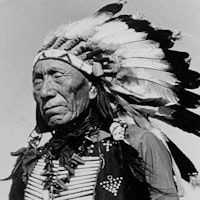It is good to have a reminder of death before us, for it helps us to understand the impermanence of life on this earth, and this understanding may aid us in preparing for our own death.
Black Elk [Heȟáka Sápa]

That World Which Is Real
Topic: Life Beyond Death & the Spirit World
It is good to have a reminder of death before us, for it helps us to understand the impermanence of life on this earth, and this understanding may aid us in preparing for our own death. He who is well prepared is he who knows that he is nothing compared with Wakan Tanka, who is everything; then he knows that world which is real.
Heȟáka Sápa, commonly known as Black Elk, was born in December 1863 along the Little Powder River in what is now Wyoming. He was a member of the Oglala Lakota (Sioux) and a second cousin to the renowned war leader Crazy Horse. From a young age, Black Elk experienced profound spiritual visions that would shape his life and destiny. At the age of nine, during a severe illness, he had a vision in which he encountered the Six Grandfathers, spiritual beings who bestowed upon him gifts and powers, including the ability to heal. This vision set him on the path to becoming a wičháša wakȟáŋ, or holy man, a role he embraced throughout his life.
Black Elk's life was marked by significant historical events and personal transformations. He participated in the Battle of the Little Bighorn in 1876 and witnessed the tragic Wounded Knee Massacre in 1890. In the late 1880s, he traveled to Europe with Buffalo Bill's Wild West Show, where he sought to understand the ways of the white people. Upon returning to the United States, he became involved in the Ghost Dance movement, which aimed to restore the Native American way of life. Despite the suppression of this movement, Black Elk continued to serve his people as a healer and spiritual leader, blending traditional Lakota practices with his later conversion to Catholicism in 1904. He became a catechist, teaching Christianity while maintaining his Lakota spiritual beliefs.
Black Elk's legacy extends beyond his lifetime through his contributions to literature and spiritual teachings. His autobiographical accounts, shared with poet John G. Neihardt and anthropologist Joseph Epes Brown, were published in the influential works "Black Elk Speaks" and "The Sacred Pipe." These books have inspired generations and contributed to the revival of Native American culture and spirituality. Black Elk's ability to integrate his Lakota heritage with his Christian faith exemplifies his resilience and adaptability. His life and teachings continue to resonate, symbolizing a bridge between cultures and a testament to the enduring spirit of the Lakota people.
The Sacred Pipe
Black Elk [Heȟáka Sápa], and Joseph Epes Brown. The Sacred Pipe: Black Elk's Account of the Seven Rites of Oglala Sioux. University of Oklahoma Press, 1953.

Black Elk [Heȟáka Sápa]
Theme: Life Beyond Death

About This Black Elk (Heȟáka Sápa) Quotation [Commentary]
Black Elk’s reflection on the impermanence of life emphasizes the value of keeping death in our awareness as a tool for spiritual understanding. This reminder helps us acknowledge the fleeting nature of life and prompts us to prepare for its end. For Black Elk, this preparation is not only about physical death but also about recognizing our place in the larger spiritual order. The contemplation of mortality reveals the truth of life’s transience and encourages us to focus on what lies beyond the physical world.
In his teachings, Black Elk highlights that true readiness for death requires deep humility before Wakan Tanka, the Great Spirit. Recognizing one’s smallness in relation to the divine helps individuals transcend the material world and see the “world which is real.” This world is the spiritual realm, where true existence resides. Preparing for death, then, involves preparing for a return to this spiritual reality.
The theme of “Life Beyond Death” is central to Black Elk’s message. By living with an awareness of mortality, we are reminded of the purity of heart needed to connect with the Great Spirit. Readiness for death is not driven by fear but by the recognition of eternal, spiritual life. Death, in this view, is not an end but a return to the sacred, a transition from the temporary to the timeless presence of Wakan Tanka.
Black Elk
Heȟáka Sápa (Black Elk) was a famous wičháša wakȟáŋ (medicine man and holy man) of the Oglala Lakota (Sioux) who lived in the present-day United States, primarily South Dakota. He was a second cousin of the war chief Crazy Horse… The Sacred Pipe is Black Elk’s Account of the Seven Rites of the Oglala Sioux (1953), as told to Joseph Epes Brown.
Additional Black Elk Quotes
Resources
Related Quotes
Copyright © 2017 – 2024 LuminaryQuotes.com About Us